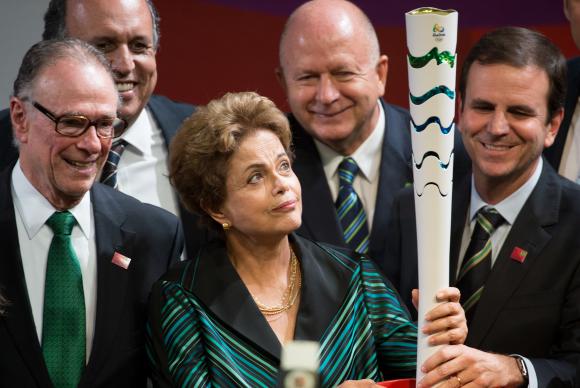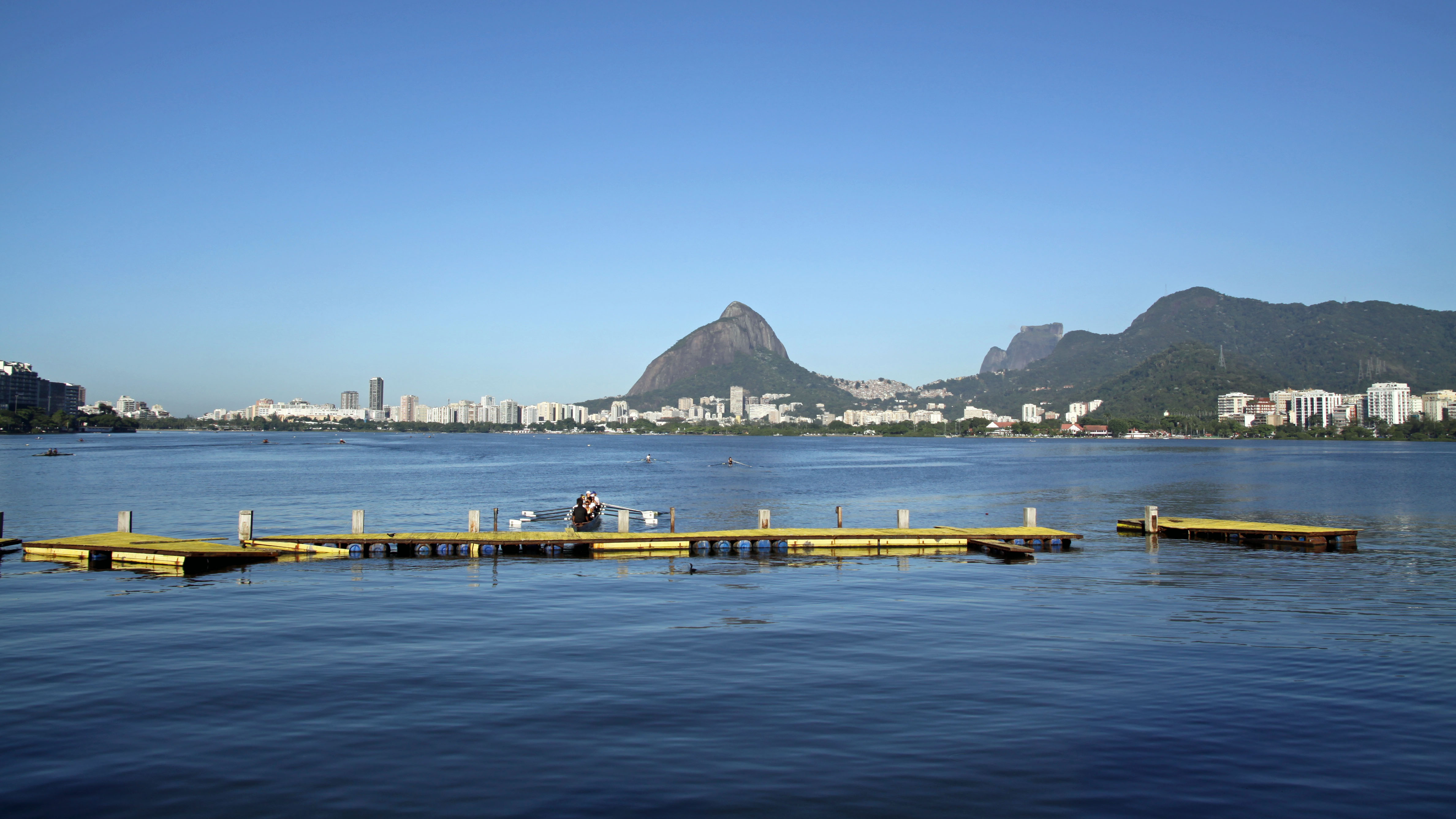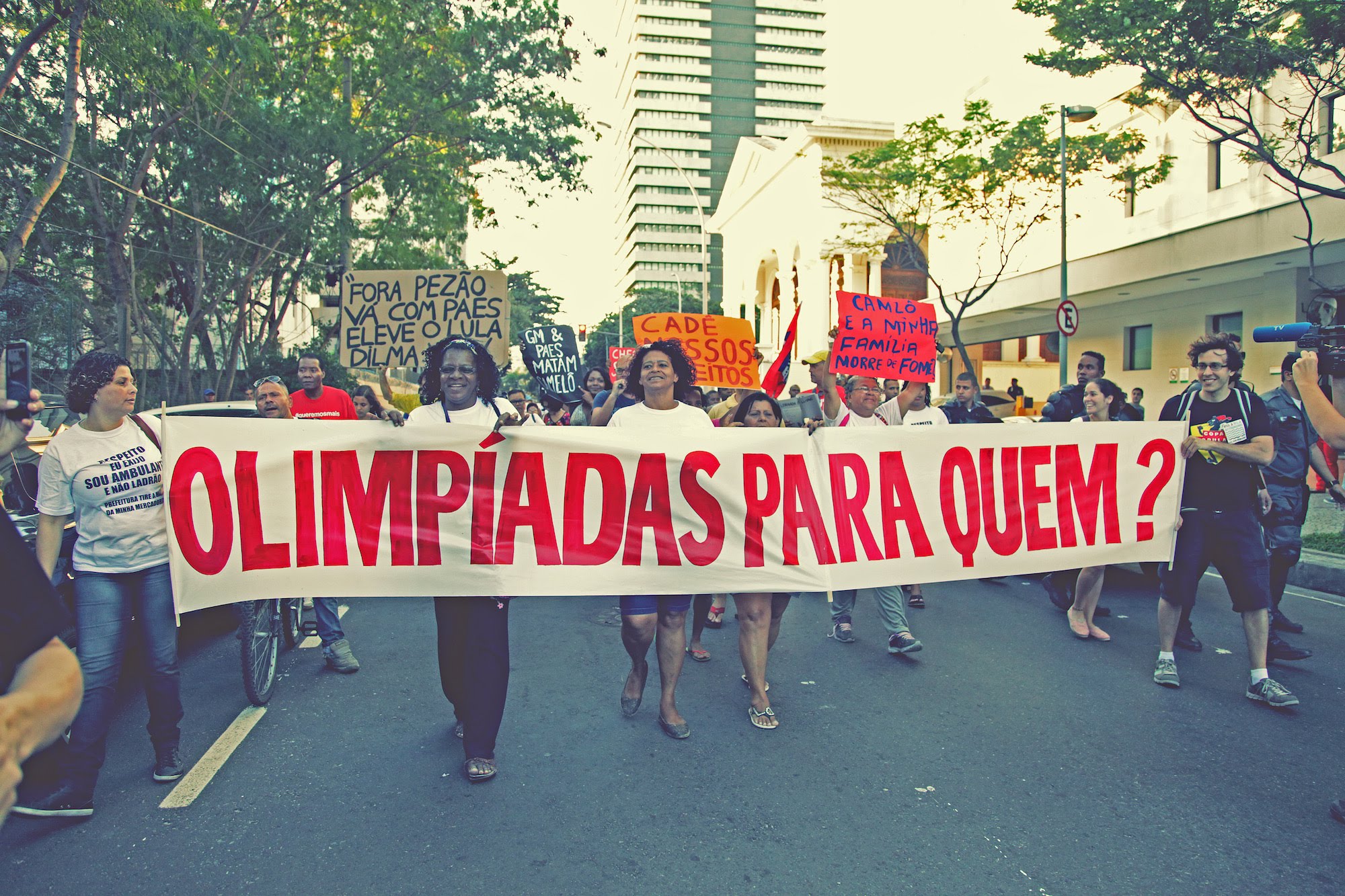Chinese Reactions to the Brazil Protests
Protests in Brazil are currently the focus of discussion and debate within Chinese government institutions.
On April 9, Dilma Rousseff inaugurated the new Olympic Aquatics Stadium in Rio de Janeiro to be used for the 2016 Summer Games. The unveiling of the state of the art stadium, a ‘model of sustainability’ featuring an energy-saving natural ventilation system and almost 15,000 seats, was a rare moment worth celebrating for the embattled Brazilian president, facing a pending impeachment vote in the lower house of Congress this Sunday, April 17. Given the state of the country right now, marred by one crisis after the other, it is somewhat surprising that the construction of Olympic venues is not only more than 95 percent complete, but ahead of schedule. Rousseff, during the inauguration, conspicuously evaded mentioning the current political crisis threatening her very role as president, instead focusing on the on-time, successful organization of the Olympics, as an indication of the country’s potential for unity “when good people come together in support of the Brazilian nation.” But with the first-ever South American Olympic Games slated to begin in just under four months on August 5, it is impossible to ignore the harm that the current situation in Brazil is inflicting on the historic occasion.

The 2016 Rio Olympics were officially announced in 2009 during a period characterized by sustained economic growth and a growing middle class. Often referred to as “the country of the future,” Brazil’s successful Olympic showing would have been the perfect opportunity to display its maturity on the world stage. But now, as the country faces the worst economic recession in more than two decades, and political turmoil at the highest levels of government with no end in sight, the event has become a financial burden, not to mention the latest victim in the country’s ever-growing Lava Jato scandal. Operation Lava Jato, or Car Wash in English, is undoubtedly Brazil’s biggest corruption probe ever, thrusting hundreds of the country’s elite into the spotlight since March 2014 for financial crimes including kickbacks and bribes at the state-controlled oil company Petrobras. Though the Games were largely immune from the scrutiny of the investigation thus far, as of last month police and investigators are now investigating the new Linha 4 Subway line and Porto Maravilha downtown revitalization projects, both made for the Games and managed by the construction giant Odebrecht, to see if these multi-billion dollar contracts were secured via bribes. Marcelo Odebrecht, the former CEO of the company, is already serving a 19-year prison sentence for money laundering and other financial crimes.
As for pulling off the event itself, the city’s current pollution, health, and safety woes confront the estimated 500,000 athletes and tourists who are planning to come to the games. The clean-up of Guanabara Bay or lack thereof, the venue to be used for Olympic sailing events, is a missed opportunity for the city, as funding problems halted the project before it could take root. Rio’s mayor Eduardo Paes inaugurated the revamped Gloria Marina on the bay last week, amid a backdrop of foul smelling waters visibly littered with trash, as runoff from treatment facilities and the petro-chemical industry into the bay continues unresolved. Major cleanups of the city’s Copacabana Beach and Rodrigo de Freitas Lagoon, to be used for Olympic triathlon swimming and rowing events respectively, also fell short, despite embarrassing Associated Press studies exposing the sewage and virus infested waters there last year.

Of course, Rio’s fetid waters are not the city’s only public health hazard. Of growing concern is the Zika virus, whose scope is still undetermined and will surely further deter attendance at the games. For now, athletes for the most part have not indicated they will skip out on the event due to the Zika virus, but the U.S. Center for Disease Control has already recommended against pregnant women or their partners attending the games. Another CDC statement from earlier this week explicitly warned that Zika is “scarier” than originally thought, and American athletes may choose to follow the lead of the high profile soccer player Hope Solo, who has already stated that she would not go to the Olympics because of the virus.
Safety concerns, in a city infamous for rampant petty crime and muggings, are as high as ever, with the added threat of a possible terrorist attack on the minds of Brazilian officials in the aftermath of recent incidents in Brussels and Paris. Brazil plans on mitigating these scenarios with a whopping 85,000 security agents in the city during the Games, more than double the number on duty in London for the 2012 Games. But the readiness of this security force is in question, following the resignation of one of its top leaders. Earlier this month, the head of the National Force for Public Security, Col. Adilson Moreira, had to step down, supposedly after having sent an internal e-mail critical of president Rousseff.
Meanwhile, impunity for security forces and their use of excessive force continue to be a problem, with largely uninvestigated deaths of young black men at the hands of military police rising ahead of the Olympics. Police brutality, in U.S. headlines once again this week after a task force in Chicago confirmed the institutional racism plaguing its city’s police department, is a way of life in Brazil, where poorly trained and underpaid policemen are said to have caused more than 1,500 homicides from 2010 to 2015 according to Amnesty International. In February 2015, a group of military policemen shot a group of 5 young men 111 times. Although the 4 policemen responsible were ultimately imprisoned for that crime, hundreds of other deaths remain “unsolved cases.” Sadly, many of the country’s middle and upper classes accept these violent, uninvestigated practices as legitimate. Yet if police continue to disregard the value of young lives of color in Rio’s favelas, the possibility of tensions boiling over is not remote. Clashes between urban youth and police in Brazilian cities are already common, as evidenced by the rash of rolezinhos making international news in 2014.

Furthermore, large scale protests in the months and weeks leading up to the Games are almost certain. Hundreds of thousands have already taken to the streets in the past couple months demanding Rousseff’s impeachment. Adding to this mood of national discontent, on the local level, Rio de Janeiro state is at the epicenter of the country’s crippling economic crisis, with much of its tax income coming from corruption-battered and deeply indebted Petrobras oil company. In addition there is growing anger in the city over forced evictions of an estimated 77,206 city dwellers to build World Cup and Olympic venues, which has already led to some violent clashes. Rio mayor Eduardo Paes, although denying corruption allegations and avoiding picking sides in the political battles at the federal level, is a ripe target for local ire. This week an International Olympic Committee (IOC) report revealed that the city government moved the Olympic Village project from its original location for the benefit of three construction companies including Carvalho Hosken, whose president Carlos Fernando de Carvalho was a major campaign donor to Paes’s mayoral run. Even more upsetting is the fact that the Olympic Village, instead of following the model of London 2012 and improving a run-down neighborhood, was designed as a brand new luxury development to be sold as apartments to a high-end market after the Games. In a city well known for its astronomical levels of economic inequality, this added to the anger of many residents.
To be sure, the current climate going into the Olympic Games in Rio leaves much to be desired. Even so, things could be worse. The last time the Games were held in Latin America, the prelude to the event was also heavy with political and social unrest, with tensions reaching a dramatic and tragic crescendo with the Tlatelcoco student massacre just ten days before the start of the 1968 Mexico City Olympics. Much as in Rio today, “coming out party” clichés surrounded the Mexican Olympics, as it was the first time the Olympics were to be held in Latin America or a developing country. But whereas student protesters demanding reforms were dealt an iron fist from Mexico’s authoritarian government in 1968, and as many as 300 people died, protests in Brazil have been peaceful thus far, a tribute to Brazil’s democracy.
As much as the country is struggling, Brazil has shown a remarkable penchant for holding its highest leaders, of various political stripes, accountable in recent months. Judicial proceedings are examining both Rousseff and her enemies in the federal government. Millions are troubled by the immunity from justice of the country’s political elites, and are pressing for change. As for Rousseff’s potential impeachment, shifting alliances and the momentum of the movement to remove her make clear that her prospects of staying in power grow smaller by the day. What will happen next, and who will be president at the start of the Olympics in August, is hard to gauge.
Despite the tumultuous climate in Brazil, the IOC insisted at a meeting this week in Rio that the Games will not be affected by the country’s political and economic crises. Just as the countdown to the 2016 Olympic Games is almost down to double digits, in yet another sign of the chaos engulfing Brazil the country’s former Minister of Sport George Hilton resigned earlier this month. Hilton’s resignation follows his departure from the Brazilian Republican Party that was formerly a part of Rousseff’s coalition government. The new Minister of Sport, Ricardo Leyser, a former liaison between the federal government and the Ministry of Sport, is now on a difficult mission to boost confidence in Brazil’s ability to host the Games and spur ticket sales. He recently stated that the Brazilian population had not yet “woken up” for the Games. Needless to say, it is easy to see why.
Protests in Brazil are currently the focus of discussion and debate within Chinese government institutions.
An analysis of the current state of education in Brazil – what does the report find and what does that mean for Brazil?
Interview discusses Latin America and its recognition of the role of education in the economy and democratic governance.